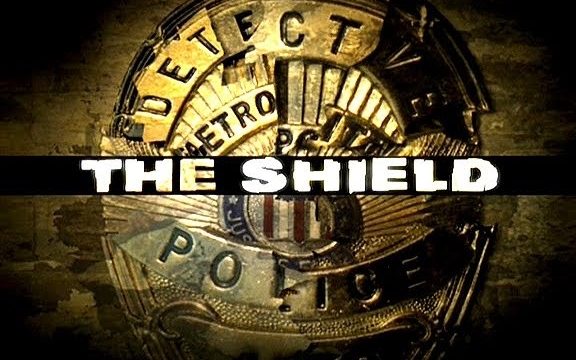One of the pleasures of The Shield is how deftly it conveys, through incident and performance, that everything we see has been going on for a while: the Strike Team’s corruption (and Gilroy’s nervousness about it), Danny’s ambitions, Julien’s homosexuality.
Gilroy and Aceveda are a lot alike, two opportunists who will use whatever’s available to maintain or acquire power. The difference is their constituency; Gilroy’s is disappearing (as he says, he and Vic are dinosaurs) and Aceveda’s is on the rise. It’s not that one is more or less corrupt than the other, it’s that one is old and one is new. As with so many things on The Shield, this is a theme that will be expressed entirely through the actions of the characters. Watch for it. (For James Ellroy fans: Gilroy is Dudley Smith and Aceveda is Ed Exley.)
The style is in place with the ninth episode, “Throwaway.” (And hey! Another episode about cleaning up a mess, and another episode where the Strike Team has to go wayyyyy outside the law to do it. You gotta love, though, that Vic apparently carries an entire set of throwaway guns in the trunk.) You don’t see much in the way of long shots; if there’s a need to establish a space and people in it, we’re more likely to see it by moving between the characters than standing away from them and seeing them all in a master shot. One element you see here that will be with us all the way to the end: the quick, partial zoom-in to focus on a single character. It’s like a little italicization; it has the same effect as a jump-cut but flows more.
Gotta love how Vic just can’t get how Julien could be mad at him. Didn’t he just do Julien a favor? For that matter, Vic can’t get how Corrine could be mad at him, and for the same reason. Isn’t he taking care of his family? In his mind, Vic is forever the good guy dealing with all the crap around him. And (as always on The Shield) actions have consequences, and not the consequences you expect: Julien gets docked and reprimanded but Aceveda’s political career looks like it will keep going, and Gilroy is getting farther away from Vic.
Evidence that there is no goddamn justice in pop culture: KK Dodds (Kim) has never become a star. Everything I’ve seen her in, no matter how crazy (she was in Prison Break and she was in the best scene in Grosse Point Blank–yes, that scene) things got around her, she’s always completely honest and completely sympathetic.
Love, so much, the end of “Cupid and Psycho.” Three characters who were pretty much a joke turn into two dead and one arrested. The camera moves across the bodies without lingering on them, there’s no dialogue, and none needed; Danny and Claudette are pretty much expressionless. They’ve seen this all before. Just another day.
THE SPOILER DISTRICT
The first season, although the most all-over-the-place, sets up a lot of character traits that start paying off almost immediately. In terms of plot, it’s the killing of Terry, Aceveda’s political launch, and the disintegration of Vic’s family that are under way now. (The last two episodes of this season are where the plot really activates, and keeps going forward to the end.) But we’re learning things about these people that will pay off massively, and not too long in the future:
–Lem has a conscience (snif). Again, he just instinctively wants to do the right thing, and that’s gonna be a problem when you’re on Team Mackey. Mackey deals with what he does by massive and constant denial (because of course two boxes of ammo look like two bricks of heroin), Ronnie deals with it in the exact opposite way, by accepting what is necessary, and as for Shane, there’s a great line from Memory of Fire: Genesis: “anyone who kills receives in his body, without wanting or knowing it, the soul of his victim.” Sometimes I think of season 6 Shane as having taken on Lem’s conscience.
–I hinted at it above, but goddamn Vic is a self-righteous mofo. It’s so important to him that he sees himself as better than whatever scum he’s beating, shooting, or framing, as a great father, and as a buddy to all the real men of Farmington. One of the reasons Mara makes such a great character is she recognizes Vic’s particular kind of bullshit and calls him on it almost immediately. Claudette also recognizes it, but it’s not a problem for her at this point in the story. Her antagonism to Vic rises in direct proportion to the power she gets in the Barn: Claudette doesn’t judge other cops but she damn well judges her cops.
–In my previous comments, I’ve really glossed over Danny. My bad. In some ways, she’s the moral anchor of The Shield: someone who is trying to be a good cop and a good mother in this world. She doesn’t have the ideals of Claudette or Julien but (as we’ve seen and will see) she has some very clear limits as to what she’ll do, and she understands the brotherhood of the police. She has to deal with crap arising from both being a cop and having the Strike Team around (most notably in the killing of Armadillo next season) and handles it all and makes it to the end of the series doing just fine. (There’s a neat structural symmetry in that the series covers two generations: Danny training Julien, and Julien training Tina, with the last day of the series happening on Tina’s one-year anniversary.)
–We’ll see the “Cupid and Psycho” kind of ending later, in “Barnstormers”: the lighter or at least more positive episode that snaps around to something horrible in the last scene.
–“Perception is reality.” You remember that, David.
Previously: “Cherrypoppers”/”Pay in Pain”
Next: “Dragonchasers”/”Carnivores”

